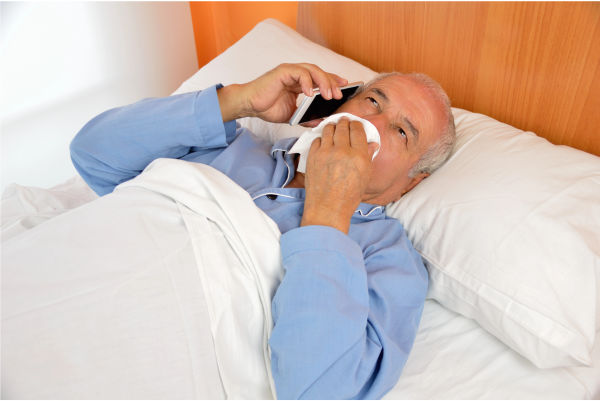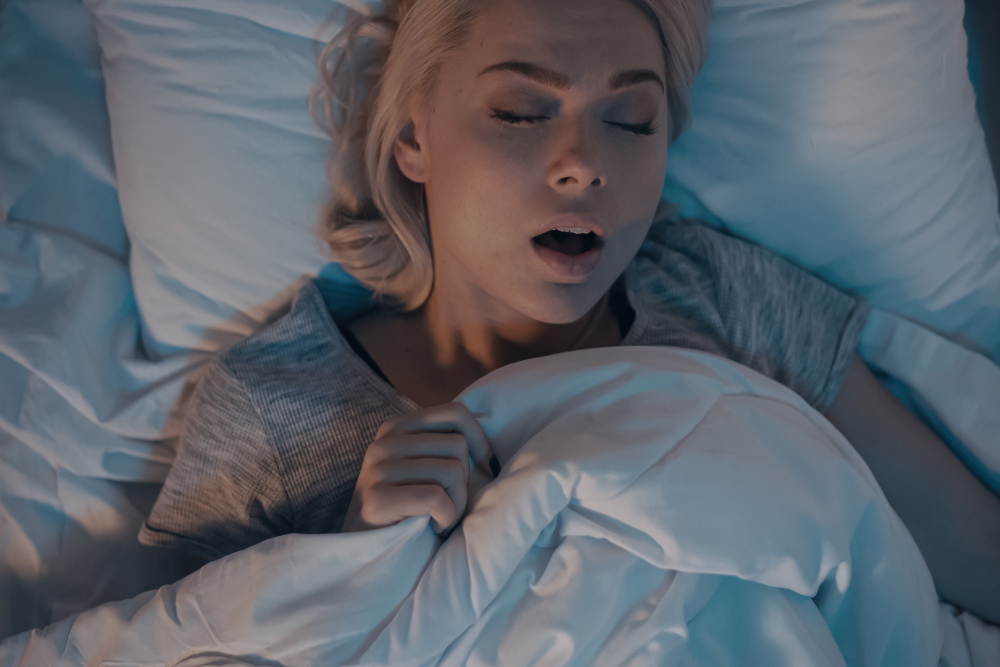Snoring is a common occurrence—many people experience it from time to time, especially when they’re tired or have a stuffy nose. But for some, snoring can be more than just an annoyance. It could be a sign of a serious health condition known as sleep apnea.
If you or someone you know snores loudly, you might be wondering: Does snoring mean I have sleep apnea? The answer isn’t always simple, but understanding the warning signs and risk factors of sleep apnea can help you determine when to seek out sleep apnea treatment in West Hills.
What is Sleep Apnea?
Sleep apnea is a sleep disorder that causes repeated interruptions in breathing during sleep. These interruptions, called apneas, can last for a few seconds or even up to a minute and can occur multiple times throughout the night. When this happens, your body briefly wakes up to restart breathing, although you may not remember these awakenings.
There are two main types of sleep apnea:
- Obstructive Sleep Apnea (OSA): This is the most common type of sleep apnea and occurs when the muscles in the throat relax too much, causing a blockage in the airway.
- Central Sleep Apnea (CSA): This type is less common and happens when the brain doesn’t send proper signals to the muscles that control breathing.
Without sleep apnea treatment in West Hills, the condition can lead to various health problems, including high blood pressure, heart disease, stroke, and daytime fatigue. It can also affect your quality of life by making it difficult to get restful sleep.
Is Snoring a Sign of Sleep Apnea?
Snoring is a classic symptom of sleep apnea, but it doesn’t automatically mean you have the condition. Snoring occurs when the airflow through the mouth or nose is partially blocked during sleep, causing the tissues in the throat to vibrate. It’s important to note that while many people with sleep apnea snore, not everyone who snores has sleep apnea.
So, how do you know if your snoring is just a harmless nuisance or something more serious and requires sleep apnea treatment in West Hills? It all comes down to recognizing the other warning signs that often accompany sleep apnea.
Also Read: Is Snoring a Sign of Sleep Apnea
Warning Signs of Sleep Apnea
If you’re concerned that your snoring could be a sign of sleep apnea, it’s essential to look out for other symptoms that may point to this condition. Some of the most common warning signs include:
1. Loud, Persistent Snoring
While not all snorers have sleep apnea, those with the condition often snore loudly and consistently throughout the night. If your snoring is loud enough to disturb your partner’s sleep or can be heard from another room, it’s worth getting checked out.
2. Gasping or Choking During Sleep
Individuals with sleep apnea may experience pauses in breathing followed by gasping or choking as their body tries to reopen the airway. This often happens without the person realizing it, but a partner or family member may notice these episodes.
3. Excessive Daytime Sleepiness
Because sleep apnea disrupts your sleep cycle, it can leave you feeling extremely tired during the day. If you find yourself frequently dozing off at work, while watching TV, or even while driving, it could be a sign that your nighttime breathing is being interrupted.
4. Waking Up With a Dry Mouth or Sore Throat
Breathing through your mouth during sleep, which is common in people with sleep apnea, can leave you with a dry mouth or sore throat in the morning. If you notice this happening regularly, it could be another clue that you’re dealing with sleep apnea.
5. Morning Headaches
Individuals with sleep apnea often wake up with headaches, which may be caused by decreased oxygen levels during sleep. These headaches usually go away after you’ve been awake for a while but can be a frustrating way to start the day.
6. Difficulty Concentrating or Forgetfulness
Sleep apnea can take a toll on your cognitive function, making it harder to focus, remember things, and stay alert. If you’ve noticed a decline in your ability to concentrate or feel mentally foggy, sleep apnea could be to blame.
7. Irritability or Mood Changes
When your body doesn’t get enough quality sleep, it can affect your mood and emotional well-being. People with sleep apnea often feel more irritable, anxious, or even depressed due to the constant fatigue they experience.
8. Restless Sleep
Frequent waking during the night, tossing and turning, or feeling like you can’t get comfortable could be signs that your sleep is being interrupted by breathing problems, like those caused by sleep apnea.
Also Read: The Dangerous Side of Snoring – Obstructive Sleep Apnea
Risk Factors for Sleep Apnea
While sleep apnea can affect anyone, certain factors can increase your risk of developing the condition. Understanding these risk factors can help you determine whether you should be more vigilant about monitoring your symptoms.
1. Excess Weight
Being overweight or obese is one of the most significant risk factors for sleep apnea. Excess fat, particularly around the neck, can put pressure on the airway, making it more likely to become blocked during sleep. Obesity is closely linked to obstructive sleep apnea, with many people experiencing significant improvement in their symptoms after losing weight.
2. Neck Circumference
Individuals with a larger neck circumference are at higher risk for sleep apnea because a thicker neck can narrow the airway, making it more prone to collapse during sleep. A neck circumference greater than 17 inches in men and 16 inches in women is considered a risk factor.
3. Age
Sleep apnea becomes more common as you get older. While it can occur at any age, the likelihood of developing the condition increases significantly after age 40.
4. Gender
Men are more likely to develop sleep apnea than women, especially at younger ages. However, the risk for women increases after menopause, and by the time women reach their 50s and 60s, their risk becomes similar to that of men.
5. Family History
If sleep apnea runs in your family, you may have a higher chance of developing the condition yourself. Genetics can influence factors like your airway structure and muscle tone, which can affect your risk of sleep apnea.
6. Smoking
Smoking can increase your risk of sleep apnea by causing inflammation and fluid retention in the upper airway. Smokers are three times more likely to develop obstructive sleep apnea compared to non-smokers.
7. Alcohol Use
Drinking alcohol before bed can relax the muscles in your throat, making it easier for your airway to become blocked during sleep. Alcohol can also interfere with your sleep patterns, making it more likely that you’ll experience apneas during the night.
8. Nasal Congestion
If you have chronic nasal congestion or other problems that make it difficult to breathe through your nose, you may be at higher risk for sleep apnea. This could be due to allergies, a deviated septum, or other structural issues in your nasal passages.
What Should You Do If You Suspect Sleep Apnea?

- High blood pressure
- Heart disease
- Stroke
- Diabetes
- Depression
- Accidents caused by excessive daytime sleepiness
The first step in diagnosing sleep apnea is to schedule an appointment with your doctor, who may recommend a sleep study. A sleep study, either done at home or in a sleep clinic, will monitor your breathing patterns, oxygen levels, and other vital signs while you sleep. Based on the results, your doctor can determine whether you have sleep apnea and how severe it is.
Also Read: The Symptoms And Effective Treatment Options For Sleep Apnea
Treatment Options for Sleep Apnea
Fortunately, there are several effective treatments available for sleep apnea, ranging from lifestyle changes to medical devices and, in some cases, surgery.
1. Lifestyle Changes
For mild cases of sleep apnea, making simple changes to your lifestyle can help reduce symptoms. This might include losing weight, quitting smoking, avoiding alcohol before bed, and sleeping on your side rather than your back.
2. CPAP Therapy
The most common and effective treatment for moderate to severe sleep apnea is continuous positive airway pressure (CPAP) therapy. A CPAP machine delivers a steady stream of air through a mask worn over the nose and/or mouth, helping to keep the airway open during sleep.
3. Oral Appliances
For people who can’t tolerate a CPAP machine, oral appliances that help keep the airway open by adjusting the position of the jaw can be an alternative treatment option.
4. Surgery
In some cases, surgery may be recommended to remove excess tissue from the throat, correct structural issues, or implant devices that help keep the airway open.
Conclusion: Does Snoring Mean You Have Sleep Apnea?
While snoring is a common symptom of sleep apnea, not everyone who snores has the condition. However, if your snoring is loud, persistent, and accompanied by other warning signs like excessive daytime sleepiness or gasping during sleep, it’s worth talking to your doctor about the possibility of sleep apnea.
Understanding your risk factors and seeking timely sleep apnea treatment in Encino and West Hills can help you manage sleep apnea effectively and improve your overall health and quality of life. Contact us today for an assessment and treatment to improve your health and sleep quality.

